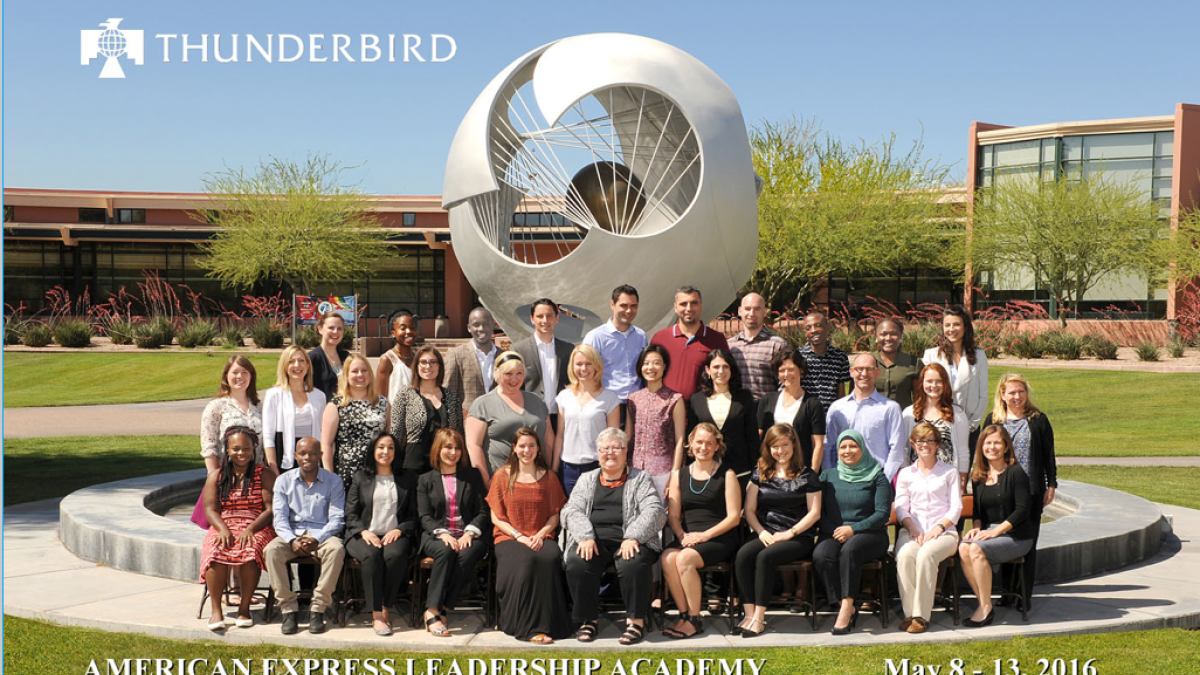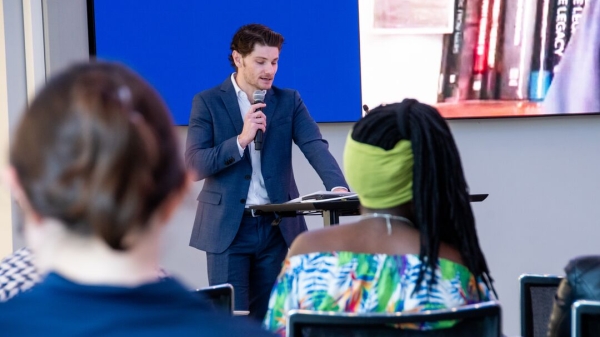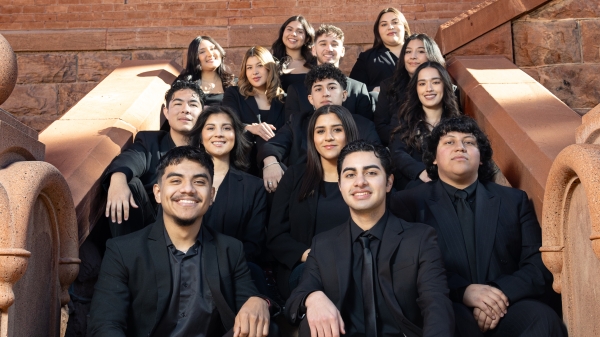Thunderbird and the American Express Leadership Academy: A tale of 2 managers

Participants from the 2016 American Express Leadership Academy at ASU's Thunderbird School of Global Management.
Editor's Note: From May 8-13, 2016, Thunderbird and American Express hosted their annual American Express Leadership Academy at Thunderbird’s Glendale, Arizona main campus. The 30 program participants from 10 different non-profit/non-governmental organizations represented 6 different countries: Kenya, Malawi, Palestine, People’s Republic of China, Uganda and the United States. Forty percent of the participants were from outside the U.S.
Thunderbird’s annual program, launched in 2009 through a partnership with American Express, has now served over 200 managers from nearly 70 organizations. Its goal is to help emerging leaders become more effective leaders for further impact on the NGO’s goals and missions.
“One of the philanthropic goals of American Express is to focus on the development of social sector leaders,” said Thunderbird Professor Mary Teagarden, Ph.D., the Academy’s Academic Director. “These participants are on their way to positions of senior leadership.”
This is the last in a series of articles highlighting how three organizations from the 2016 Academy experienced its value and impact. Read part one and part two.
The great thing about the American Express Leadership Academy is that both mid-level managers and executives can benefit from the experience. Michelle Kuchuk and Jen James from the Crisis Text Line are a perfect example. For them — one a mid-level manager and the other a founding supervisor — attending the Academy together allowed them both to come away as stronger members of their organization.
The Crisis Text Line is a US-based help line that uses text messaging to assist those in crisis. Since August2013, their service has handled over 27 million text messages. It currently works with more than 2,500 volunteers in more than 10 countries, including Israel, London and Dubai.
When she came to the Leadership Academy, Kuchuk was struggling with identifying how she could become a better manager who supervised volunteer training and reporting information up the organization’s chain of command.
“The assessments [we took] were helpful in understanding my strengths and weaknesses. They were also empowering because the organization didn’t have a strong program of management training,” she said. “[The assessments] helped me identify strengths that weren’t being utilized at CTL and pulling out what I’m naturally good at.”
James is one of the founding supervisors at Crisis Text Line and helps manage remote volunteers, develops training and other content. She came to the Leadership Academy looking to improve not only as a manger, but also to help the organization with volunteer churn.
“One of the thing I gained from the Academy was an appreciation of other NGOs and the challenges they face. I was really in a bubble, and my experience at the Leadership Academy opened my eyes,” she said.
One of the biggest personal lessons she learned was how to work with her teams in a more thoughtful manner.
“I was able to find out who I am — learning that I sometimes need to take some time to process instead of having to give an immediate answer — and how to share that in a way that shows I understand and respect the other person, but need some time to consider my response,” she said. “The ability to self-reflect was amazing.”
And while self-discovery is certainly a goal of the academy, so is solving a challenge faced by participants’ organizations.
“One of the things CTL (Crisis Text Line) has been dealing with is volunteer churn, a pretty common thing in this industry. The American Express Leadership Academy gave us a whole week to focus on the problem, each other and our mutual teams,” James said. “It also brought in a sense of urgency and allowed us to focus. Bottom line, the experience sped up the process for coming up with a plan.”
“One of the solutions we walked away with was creating consequences to volunteering,” Kuchuk said. “Most organizations are lax with their volunteers, letting them do what they want because, well, they’re volunteers. What we learned is, if you create consequences that permit them to have certain responsibilities or others that can get them removed from the program, you have a stronger commitment — even if you lose a few more on the front end of the process.”
But did it work?
“We implemented almost everything we came up with [during the Academy], resulting in a 4 percent decrease in our churn rate,” said James. “We know that crisis volunteers get burned out and sometimes college students volunteer thinking they’ll have more time than they wind up having.”
And Kuchuk's challenge of being a better manager?
“The Leadership Academy gave me the tools to ‘clear the decks’ so my team could do its job. Being a middle manager can be a thankless job … not always in a bad way. I learned how to be a better manager, which sometimes means I have to make decisions that aren’t always popular. But the job of a manager is sometimes like that, isn’t it?”
If you know of a non-profit organization that could benefit from the American Express Leadership Academy, contact Debisu Hyde, key account director, at debisu.hyde@thunderbird.asu.edu.
Read more about Thunderbird's American Express Leadership Academy.
More Business and entrepreneurship

California roots, global impact: Thunderbird at ASU grad's journey in global management
Editor's note: This story is part of a series of profiles of notable spring 2024 graduates. Lake Forest, California, native…

ASU student entrepreneurs win cash investments for ventures at Demo Day
Several Arizona State University student entrepreneurs who won big cash investments for their ventures on Saturday expressed…

Hispanic Business Students Association marks half a century of impact, growth
When Michelle Macias, a native of Yuma, Arizona, became a business entrepreneurship and management student at Arizona State…